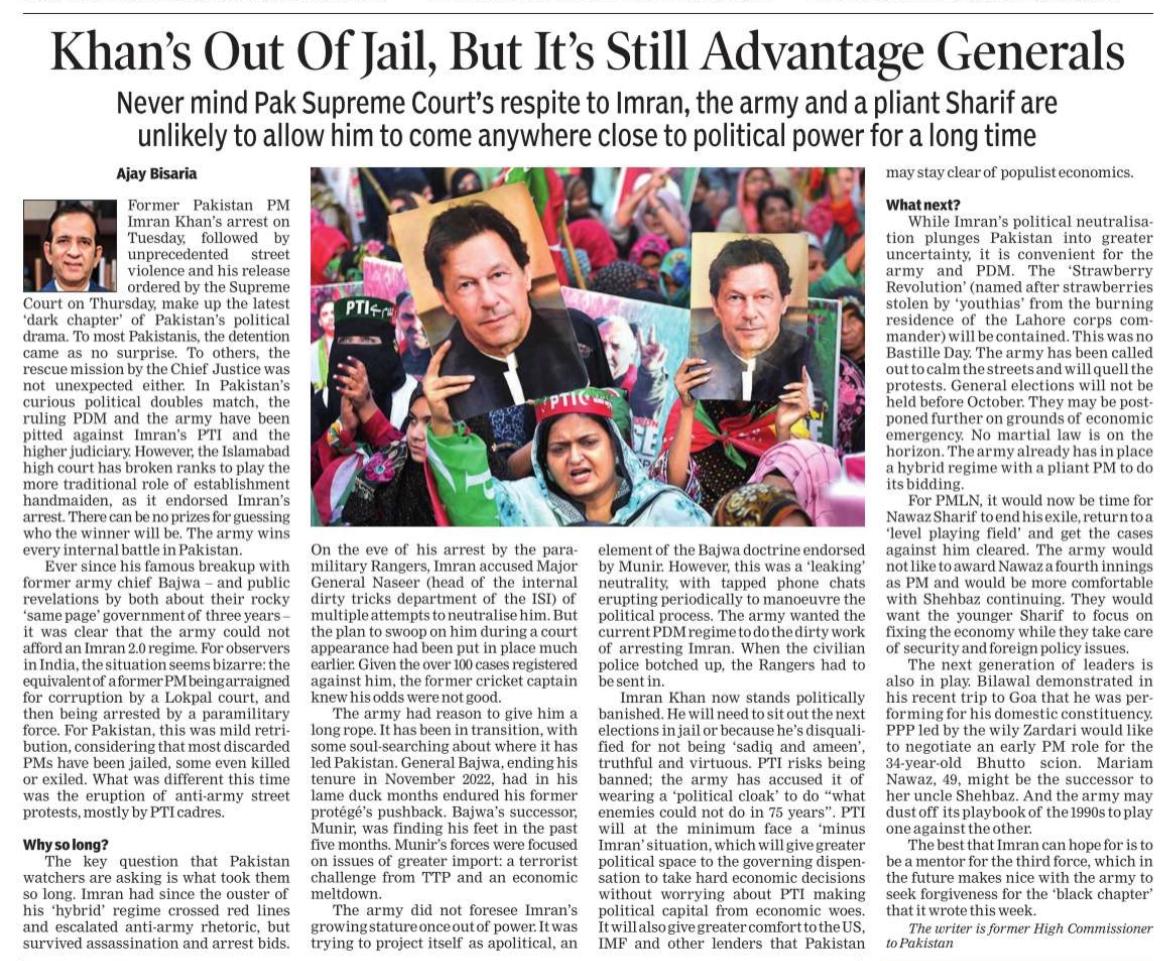Khan’s out of jail, but it’s still advantage generals
Never mind Pak Supreme Court’s respite to Imran, the army and a pliant Sharif are unlikely to allow him to come anywhere close to political power for a long time
As Pakistan’s Prime Minister Shahbaz Sharif enjoyed the coronation ceremony of King Charles in London, another power center struck back at home, suppressing a rebellion that had persisted too long.
The arrest of former Prime Minister Imran Khan on Tuesday, followed by the detention of other PTI leaders the next day, was the predictable conclusion of a political saga. To most Pakistanis, the arrest was not surprising. On the eve of the operation, Imran accused Major General Naseer, head of the ISI’s internal dirty tricks department, of multiple attempts to eliminate him. However, the plan to apprehend him during a court appearance had been set in motion much earlier. With over a hundred cases against him, the former cricket captain knew his chances were slim. He might have avoided most of the bouncers, but eventually, one would get him out.
Ever since his famous breakup with former army chief Bajwa- and public revelations by both about their rocky ‘same page’ government of three years- it was clear that the army could not afford an Imran 2.0 regime. For observers in India, the situation seems bizarre: the equivalent of a former PM being arraigned for corruption by a Lokpal court, and then being arrested by a para-military force. For Pakistan, this was mild retribution, considering that most discarded PMs have been jailed, some even killed or exiled. What was different this time was the eruption of anti-army street protest, mostly by PTI cadres.
Why So Long?
The key question that Pakistan watchers are asking is what took them so long. Imran had since the ouster of his ‘hybrid’ regime crossed red lines and escalated anti-army rhetoric, but survived assassination and arrest bids. The army had reason to give him a long rope:
The Pakistan Army has been undergoing a period of transition and introspection about its role and direction. General Bajwa, who concluded his tenure in November 2022, faced resistance from his former protégé during his final months. His successor, General Munir, has been navigating his new role for the past five months, focusing primarily on significant issues such as the terrorist threat from the TTP and the country’s economic crisis. The army did not anticipate the rise in Imran Khan’s popularity after he was ousted from power; his increasing street support and active opposition to the establishment took them by surprise. Attempting to appear apolitical, as part of the Bajwa doctrine supported by Munir, the army’s neutrality was frequently undermined by leaked phone conversations that influenced political developments. The military preferred the current PDM regime to handle Imran’s arrest, but when the civilian police failed, the Rangers had to step in. This led to a deadlock as the army reduced its political involvement, aligning itself with the ruling PDM against the PTI and the higher judiciary. Nevertheless, the Islamabad High Court diverged from this stance, acting in its traditional role of supporting the establishment by endorsing Imran’s arrest.
Imran Khan now stands politically banished. He will need to sit out the next elections in jail or disqualified for not being ‘sadiq and ameen’, truthful and virtuous. The PTI risks being banned; the army has accused it of wearing a ‘political cloak’ to do ‘what enemies could not do in 75 years’. The PTI will at the minimum face a ‘minus Imran’ situation, which will give greater political space to the ruling dispensation to take hard economic decisions without worrying about the PTI making political capital from economic woes. It will also give greater comfort to the US, IMF and other lenders that Pakistan may stay clear of populist economics.
What Next?
While Imran’s political neutralisation plunges Pakistan into greater uncertainty, it is convenient for the army and the PDM. What does the future hold?
The so-called ‘Strawberry Revolution,’ named after strawberries stolen by ‘youthias’ from the burning residence of the Lahore corps commander, will be contained and is not expected to escalate into a significant event like Bastille Day. The army has been deployed to restore order and suppress the protests. General elections are not expected before October, with the possibility of being held simultaneously at the federal and provincial levels, or potentially postponed further due to economic emergencies. There is no indication of impending martial law, as the army already operates within a hybrid regime featuring a compliant prime minister who follows its directives. For the PMLN, it is now time for Nawaz Sharif to end his exile, return to a ‘level playing field,’ and seek to have the cases against him dismissed. However, the army would prefer Shahbaz Sharif to continue as prime minister, focusing on economic recovery while the military handles security and foreign policy. Meanwhile, the next generation o’ leaders is emerging. Bilawal Bhutto Zardari, having performed for his domestic audience during a recent trip to Goa, is seen as a potential early candidate for prime minister under the PPP, led by the shrewd Asif Ali Zardari. Mariam Nawaz, aged 49, is considered a likely successor to her uncle Shahbaz. The army may revive its 1990s strategy of pitting political leaders against each other to maintain control.
In this scenario, the best that Imran can hope for is to be a mentor for the third force, which in the future makes nice with the army, to seek forgiveness for the ‘black chapter’ that it wrote this week.
An edited version was first published in Times of India on May 12, 2023
